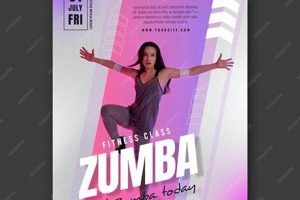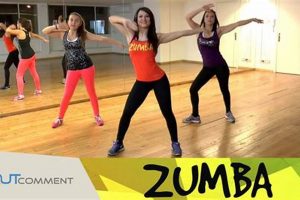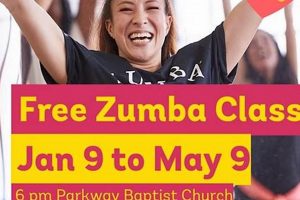Opportunities to participate in complimentary Zumba sessions within New York City provide access to a popular fitness program that blends dance and aerobic movements. These sessions aim to make exercise more accessible to a broader audience, often removing financial barriers that may prevent participation in structured fitness activities. Individuals can expect energetic workouts led by qualified instructors, generally held in community centers, parks, or through sponsored events.
The availability of no-cost dance fitness programs yields multiple benefits, extending beyond basic physical activity. They can foster community engagement, provide stress relief, and promote overall well-being. Historically, such initiatives have played a crucial role in public health, encouraging a more active lifestyle and contributing to the prevention of sedentary-related diseases. They also offer a chance for individuals to try new forms of exercise without upfront investment, potentially leading to long-term adoption of healthier habits.
The following sections will delve into the specifics of locating these opportunities, exploring the various organizations that offer them, and highlighting the practical considerations for those interested in participating. Information regarding schedules, locations, and necessary pre-registration procedures will be detailed to ensure easy access to these beneficial fitness options.
Tips for Locating Complimentary Zumba Opportunities in New York City
Maximizing the chances of finding suitable no-cost Zumba sessions requires a strategic approach. Due to the often limited availability and popularity of these classes, proactive measures are recommended.
Tip 1: Utilize City Resource Websites: Official New York City government websites often list free or low-cost recreational programs. Regularly checking these sites can reveal Zumba classes offered through parks departments or community initiatives.
Tip 2: Explore Community Centers: Local community centers frequently host complimentary fitness programs. Contact nearby centers directly to inquire about their Zumba schedules and registration procedures.
Tip 3: Follow Social Media Channels: Many organizations promoting these sessions use social media to announce events. Monitoring relevant hashtags and accounts can provide real-time updates on upcoming opportunities.
Tip 4: Check Local Gyms and Studios: Some gyms or dance studios may offer introductory Zumba classes free of charge to attract new members. Research introductory offers from local businesses.
Tip 5: Leverage Event Listing Websites: Websites dedicated to listing local events sometimes feature free fitness classes. Search relevant categories and keywords to uncover Zumba opportunities.
Tip 6: Inquire at Libraries: Public libraries occasionally host health and wellness programs, including fitness classes. Check the library’s event calendar for potential Zumba sessions.
Tip 7: Consider Pop-Up Events: Keep an eye out for pop-up fitness events, often held in public spaces during warmer months. These events may feature Zumba instruction as part of a broader fitness initiative.
Following these recommendations increases the likelihood of discovering and participating in accessible dance fitness classes. Consistent effort and active engagement with local resources are key to successfully accessing these opportunities.
The subsequent sections will focus on specific organizations known to provide these classes and address any logistical considerations for attendees.
1. Availability
Availability, in the context of no-cost Zumba sessions within New York City, is a fluctuating factor that significantly influences accessibility to this fitness activity. Its unpredictable nature necessitates a proactive and informed approach from individuals seeking to participate.
- Seasonal Variations
Outdoor classes, often held in parks, are primarily available during warmer months. Colder weather limits outdoor options, potentially increasing demand for indoor sessions at community centers. This seasonal dependence creates ebbs and flows in availability, affecting the ease with which individuals can access classes.
- Funding Fluctuations
Many complimentary Zumba programs are supported by grants or sponsorships. Changes in funding levels can directly impact the frequency and duration of these programs. A reduction in funding may lead to fewer classes or program cancellations, thereby decreasing availability.
- Location Disparities
Availability tends to be unevenly distributed across the five boroughs. Some neighborhoods may have multiple options, while others have very few or none. This geographic disparity creates accessibility challenges for residents in underserved areas, requiring them to travel to participate.
- Instructor Capacity
The number of qualified Zumba instructors willing to donate their time or work for reduced compensation limits the number of classes that can be offered. Instructor availability directly constrains the overall supply of no-cost Zumba opportunities. Finding and retaining qualified instructors is crucial for sustaining these programs.
Ultimately, the availability of complimentary Zumba sessions in New York City is a dynamic variable influenced by various factors. Navigating this landscape effectively requires consistent monitoring of resources and a flexible approach to scheduling and location.
2. Locations
The geographic setting is a defining element in the availability and accessibility of complimentary Zumba sessions within New York City. The specific venue where a class is held profoundly impacts who can participate, the type of experience offered, and the logistical considerations for attendees.
- Public Parks and Recreation Centers
Outdoor spaces, managed by the NYC Parks Department, often serve as sites for seasonal Zumba programs. These locations provide ample space and a connection to nature, fostering an open and inviting atmosphere. However, weather dependency and limited facilities, such as restrooms or shelter, can be drawbacks. Indoor recreation centers offer year-round options but may have limited capacity or require pre-registration.
- Community Centers and Non-Profit Organizations
Neighborhood-based community centers provide accessible venues for Zumba classes, often targeting specific demographic groups. These locations offer a sense of familiarity and community, encouraging local participation. Non-profit organizations may partner with instructors to offer free classes as part of broader community outreach initiatives.
- Libraries and Educational Institutions
Public libraries and schools sometimes host Zumba sessions as part of their community programming. Libraries offer a safe and accessible environment for participants of all ages and backgrounds. Schools may open their gyms or auditoriums for after-school or weekend Zumba classes, promoting fitness within the student population and the wider community.
- Gyms and Fitness Studios (Promotional Events)
Commercial gyms and fitness studios occasionally host free Zumba classes as promotional events to attract new members. These sessions offer participants access to professional-grade facilities and instruction, but they often come with a sales pitch or require registration for a limited-time trial. While offering a taste of a paid fitness environment, the long-term cost can be a barrier for some.
The diverse range of locations reflects the multifaceted approach to making dance fitness accessible in New York City. From public parks to community centers, each venue offers a unique set of benefits and challenges, shaping the overall experience and reach of “free zumba classes nyc.” The strategic selection and utilization of these locations are crucial for maximizing participation and promoting community well-being.
3. Instructors
The effectiveness and accessibility of complimentary Zumba programs within New York City are inextricably linked to the quality and dedication of the instructors who lead these sessions. These individuals serve as pivotal figures, shaping participant experience, ensuring safety, and fostering an inclusive environment.
- Certification and Expertise
Certified Zumba instructors possess specialized training in the specific dance-fitness methodology. This expertise ensures that participants receive guidance based on sound exercise principles and that movements are executed safely to minimize the risk of injury. Uncertified instructors may lack the necessary knowledge to provide effective and safe instruction, potentially compromising the benefits and increasing the risks associated with participation in sessions.
- Volunteerism and Community Engagement
Many instructors who lead no-cost Zumba classes do so on a volunteer basis, driven by a commitment to community well-being and a passion for fitness. Their willingness to donate their time and expertise allows organizations to offer programs that would otherwise be financially unsustainable. This altruistic contribution is fundamental to the accessibility of free fitness opportunities in underserved communities.
- Adaptability and Inclusivity
Effective instructors tailor their classes to accommodate participants of varying fitness levels, ages, and physical abilities. They create a welcoming and non-intimidating atmosphere that encourages individuals to participate regardless of their prior experience or physical limitations. This adaptability is essential for promoting inclusivity and ensuring that everyone can benefit from the physical and social aspects of Zumba.
- Motivational and Inspirational Role
Beyond technical instruction, instructors play a critical role in motivating participants and fostering a sense of community. They provide encouragement, celebrate successes, and create a supportive environment that inspires individuals to adopt a healthier lifestyle. Their enthusiasm and positive energy are contagious, making classes enjoyable and encouraging continued participation.
In summary, the quality of instructors directly impacts the success and sustainability of free Zumba programs in New York City. Their certification, volunteerism, adaptability, and motivational skills are essential for providing safe, effective, and inclusive fitness opportunities that benefit individuals and strengthen communities.
4. Schedules
The availability of complimentary Zumba sessions in New York City is inextricably linked to carefully planned and communicated schedules. These schedules dictate when and where classes occur, acting as the primary interface between potential participants and the fitness opportunities themselves. Ineffective or inconsistent schedules can severely limit access, even if classes are technically available, thus negating the benefits of offering such programs at no cost. The schedules act as a critical determinant of whether or not individuals can effectively integrate these classes into their lives. Without clear schedules, locating these activities becomes very difficult.
Real-world examples highlight the significance of well-managed schedules. A community center offering free Zumba on Tuesdays and Thursdays at 6 PM, with consistent adherence to this timetable and updates posted online, will likely see higher and more consistent attendance than a similar program with an irregular schedule that is only communicated through flyers posted within the center. Moreover, the timing of classes can significantly impact accessibility for different populations. Classes scheduled during standard working hours might exclude many full-time employees, while sessions offered on weekends or evenings could be more accessible.
In conclusion, the effective management and communication of schedules are essential components of any successful program offering complimentary Zumba in New York City. Challenges in scheduling, such as securing facility space or coordinating instructor availability, must be addressed proactively to maximize participation. By prioritizing clear, consistent, and accessible schedules, organizations can ensure that these fitness opportunities are genuinely available to the communities they aim to serve, thereby supporting wider public health initiatives.
5. Registration
The process of registering for no-cost Zumba sessions within New York City forms a crucial intersection between accessibility and program management. Registration procedures, whether simple or complex, directly influence who can participate and how effectively the program operates.
- Capacity Management
Mandatory registration allows organizers to control class sizes, preventing overcrowding and ensuring a safe and effective workout environment. Pre-registration systems, often online, enable them to accurately gauge interest and plan accordingly. This proactive management reduces the likelihood of participants being turned away due to space limitations.
- Data Collection and Analysis
Registration processes facilitate the collection of demographic data, enabling organizations to understand who is benefiting from the programs and identify underserved populations. This data can be used to tailor future offerings and target outreach efforts more effectively. Analysis of registration data may reveal patterns or trends that inform strategic decisions about program development and resource allocation.
- Liability and Waiver Agreements
Registration provides a mechanism for participants to acknowledge and accept liability waivers, protecting organizations from potential legal claims. These waivers outline the risks associated with physical activity and ensure that participants are aware of their responsibilities. The documented acceptance of these terms is a crucial component of risk management.
- Communication and Notifications
Registration systems allow organizers to communicate important information to participants, such as class cancellations, schedule changes, or special events. Automated email or SMS notifications ensure that participants are kept informed in a timely manner, improving the overall experience and fostering a sense of community. Efficient communication minimizes disruption and encourages continued participation.
The integration of a registration process, while sometimes perceived as a barrier, plays a vital role in the sustainability and effectiveness of complimentary Zumba programs in New York City. By balancing the need for program management with the goal of accessibility, organizers can create a system that benefits both participants and the organizations providing these valuable fitness opportunities.
6. Benefits
The provision of no-cost Zumba sessions in New York City yields a cascade of positive outcomes, directly impacting individual well-being and community health. The removal of financial barriers to participate in these fitness activities is a primary driver for increased engagement, leading to demonstrable physical and mental health improvements. Participants experience enhanced cardiovascular health, improved muscle tone, and increased flexibility as direct results of consistent involvement. Furthermore, the group dynamic inherent in Zumba classes fosters social connections, mitigating feelings of isolation and contributing to a sense of belonging.
The benefits extend beyond the purely physical realm. Regular participation in dance fitness programs has been linked to reduced stress levels, improved mood, and enhanced cognitive function. The rhythmic movements and engaging music stimulate the release of endorphins, naturally promoting feelings of happiness and well-being. For example, studies have shown that individuals experiencing social anxiety often report reduced symptoms and increased confidence after consistently attending group fitness classes such as Zumba. The availability of these classes at no cost makes these benefits accessible to individuals who may not otherwise have the means to prioritize their mental or physical health.
In summary, the benefits derived from complimentary Zumba sessions in New York City are multifaceted and far-reaching. By removing financial constraints and fostering an inclusive environment, these programs empower individuals to improve their physical fitness, enhance their mental well-being, and strengthen their social connections. The provision of accessible fitness opportunities represents a strategic investment in public health, contributing to a healthier and more vibrant community. The challenge lies in ensuring the long-term sustainability and equitable distribution of these valuable resources across all neighborhoods and demographic groups.
Frequently Asked Questions
This section addresses common inquiries regarding opportunities to participate in no-cost Zumba sessions throughout New York City. Information provided aims to clarify access, logistics, and expectations for prospective participants.
Question 1: Are the advertised Zumba sessions genuinely free, or are there hidden costs?
The term “free” indicates that there is no direct fee charged for participation in the Zumba class itself. However, certain locations may require membership to access their facilities, or participants may be encouraged to make donations to support the program. It is advisable to confirm the specific terms and conditions with the hosting organization prior to attendance.
Question 2: What level of fitness is required to participate in these sessions?
Complimentary Zumba classes are generally designed to accommodate a range of fitness levels, from beginners to more experienced participants. Instructors often provide modifications to movements to cater to individual needs and abilities. However, individuals with pre-existing health conditions should consult with their physician before engaging in any new exercise program.
Question 3: How can one verify the credentials and experience of the Zumba instructor?
Reputable organizations offering free Zumba classes typically employ certified instructors who have undergone specific training in the Zumba methodology. Inquiries regarding an instructor’s certification and experience can be directed to the hosting organization or, in some cases, the instructor themselves. Certification through recognized Zumba training programs provides assurance of a baseline level of competence.
Question 4: What should be brought to a Zumba session?
Participants should wear comfortable clothing that allows for unrestricted movement and supportive athletic shoes. It is also recommended to bring a water bottle to stay hydrated and a towel to manage perspiration. Some locations may provide equipment such as mats, but it is prudent to confirm this in advance.
Question 5: Is pre-registration required, or can individuals simply attend the classes?
The requirement for pre-registration varies depending on the location and organization. Due to limited space, many sessions operate on a first-come, first-served basis, necessitating pre-registration to secure a spot. Other classes may allow walk-ins, but it is advisable to check the specific policy to avoid potential disappointment.
Question 6: What measures are in place to ensure participant safety during the Zumba sessions?
Responsible organizations prioritize participant safety by employing certified instructors, providing adequate space for movement, and ensuring a safe environment free from hazards. Participants are typically encouraged to listen to their bodies, modify movements as needed, and inform the instructor of any pre-existing health conditions. Furthermore, the presence of first-aid equipment and trained personnel is advisable.
This FAQ section provides foundational information regarding access to complimentary Zumba classes in New York City. Prospective participants are encouraged to conduct thorough research and communicate directly with hosting organizations to address specific concerns or inquiries.
The subsequent segment of this article will delve into practical considerations for participation, including logistical planning and etiquette guidelines.
Conclusion
This exploration has detailed the multifaceted landscape of complimentary Zumba sessions within New York City, emphasizing the importance of availability, location, qualified instructors, consistent scheduling, accessible registration, and the resulting physical and social benefits. Navigating this environment effectively requires diligent research and proactive engagement with community resources.
The continued provision and promotion of “free zumba classes nyc” represent a valuable investment in public health and community well-being. Ensuring the sustainability and equitable distribution of these opportunities remains a critical objective, demanding ongoing collaboration between organizations, instructors, and the communities they serve. The long-term impact of accessible fitness programs extends beyond individual health, fostering stronger, more vibrant, and connected communities throughout New York City.




![Find FREE Zumba Classes Near Me for Ladies - [Location]! The Ultimate Zumba Guide: Dance Your Way to a Healthier You Find FREE Zumba Classes Near Me for Ladies - [Location]! | The Ultimate Zumba Guide: Dance Your Way to a Healthier You](https://mamazumba.com/wp-content/uploads/2025/10/th-896-300x200.jpg)


